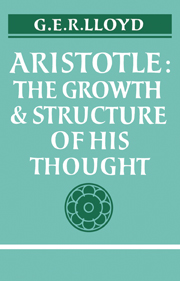Book contents
- Frontmatter
- Contents
- Preface
- Abbreviations
- PART I INTELLECTUAL DEVELOPMENT
- 1 Life and writings
- 2 The pupil of Plato
- 3 The critic of Plato
- 4 The philosopher of nature
- 5 The founder of systematic research
- PART II FUNDAMENTALS OF ARISTOTLE'S THOUGHT
- Suggestions for farther reading
- Glossary of Greek terms
- Index of passages referred to
- General Index
2 - The pupil of Plato
Published online by Cambridge University Press: 06 July 2010
- Frontmatter
- Contents
- Preface
- Abbreviations
- PART I INTELLECTUAL DEVELOPMENT
- 1 Life and writings
- 2 The pupil of Plato
- 3 The critic of Plato
- 4 The philosopher of nature
- 5 The founder of systematic research
- PART II FUNDAMENTALS OF ARISTOTLE'S THOUGHT
- Suggestions for farther reading
- Glossary of Greek terms
- Index of passages referred to
- General Index
Summary
Until comparatively recently Aristotelian studies were dominated by the assumption that the doctrines the Corpus contains form a single perfected system. In this, as in many other respects, Aristotle was sharply contrasted with Plato. While Plato's thought was generally recognised—from the early nineteenth century, at any rate—as a complex entity that evolved throughout his life, Aristotle's philosophy was thought of as quite the opposite, a static, dogmatic, monolithic whole. When discrepancies were noted between the doctrines expressed in two different passages in the treatises, the tendency was to assume that one or other passage was corrupt and to emend the text accordingly. So long as Aristotle was treated, as he was throughout the Middle Ages, as a preeminent, if not infallible, authority on most philosophical issues, the possibility that this authority ever changed his mind was not seriously entertained. But even when a more critical attitude towards Aristotle became the rule, it was still generally assumed that his philosophy formed an unvarying dogmatic system, and this assumption was not challenged until well into the present century.
Jaeger's thesis
The major force in what may, without exaggeration, be called the revolution in Aristotelian studies was Werner Jaeger. In 1912 Jaeger produced a study of the development of the Metaphysics, and then in 1923 appeared the first edition of his general work, Aristotle: Fundamentals of the history of his development.
- Type
- Chapter
- Information
- AristotleThe Growth and Structure of his Thought, pp. 19 - 41Publisher: Cambridge University PressPrint publication year: 1968



